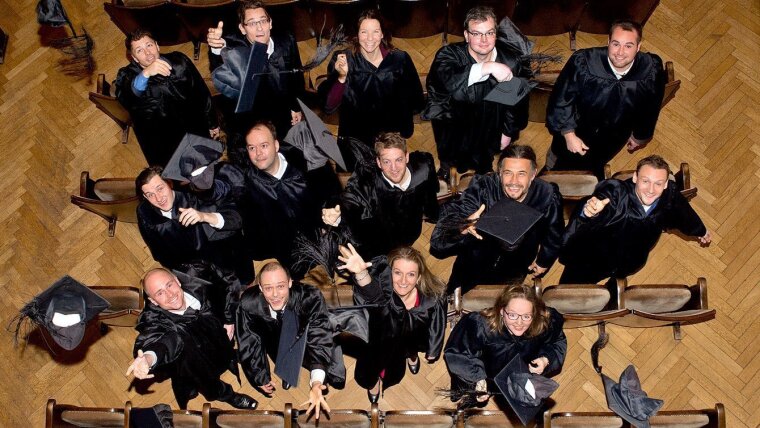
The doctoral phase is a time-limited period of initial postgraduate research and at the same time a qualification phase for a professional goal within or outside academia. It ends with the candidate either obtaining a doctorate from the faculty or dropping out of the doctoral research project. The challenge for the university is to ensure that all or as many young researchers as possible who have decided to take this career step and have been accepted as doctoral researchers are successful in obtaining their doctorate. If doctoral candidates and their supervisors come to a different conclusion after the doctoral research has started, a decision to discontinue should be made as early as possible.
Successfully obtaining a doctorate is more than just formally completing the doctoral examination procedure. It also involves an appropriate time-to-degree, high academic quality and the highest possible level of subject-specific and transversal qualification in relation to the candidate's individual career goals.
-
Good supervision
An essential key to a successful doctorate is good supervision by the doctoral supervisor. The relationship between supervisor and doctoral researcher lays the foundation for academically valuable research work carried out in the limited time available. Professional support, regular constructive feedback and joint process planning ensure that a doctoral project progresses. The guidelines for the doctoral phasepdf, 351 kb · de at Friedrich Schiller University Jena include agreed standards of good supervision.
-
Structuring the doctorate
Structured programmes (graduate schools, research training groups, doctoral programmes), if well designed, offer a suitable framework for swift and successful doctorates. However, moderate structuring can also be helpful for doctorates that are outside these programmes. This includes supervision agreements, double supervision/supervision teams, regular supervision meetings, progress reports, collective recruitment, subject-specific and interdisciplinary qualification opportunities, as well as support for introduction into the research community.
-
Create a reliable employment and funding situation
The doctoral phase is inherently limited in time. The framework for employment policy is provided by the German Academic Short-Term Labour Contract Act [Wissenschaftszeitvertragsgesetz]. Within this framework, the university organises employment contracts in such a way that at least a half-time position is available for a period of three years. The "Guideline for the Arrangement of Fixed-Term Employment Contracts for Academic Staff at Friedrich Schiller University Jena"pdf, 474 kb · de was resolved for this purpose and the guideline will be continually evaluated and updated. Limited central funding will continue to be provided in emergencies to help candidates complete their doctorates.
-
Effective support structures
In the event of problems and conflicts, easily accessible support structures are provided and expanded as needed. These include advice on funding, an ombudsman's service for conflicts in the supervision relationship, persons of trust for good scientific practiceExternal link, and a Mental Health First Aid team.
-
Career orientation, career counselling, career talks
Doctoral candidates are offered services to help them find out about career options, the requirements for those careers, their individual prospects and the steps to be taken. Specialist advice through regular career talks with supervisors or other contact persons at the graduate institutions and faculties is supplemented by a variety of centrally organised events, as well as information and counselling services.
-
Opportunities for subject-specific professional qualification
Doctoral researchers achieve professional qualifications through active research, exchanges with the international scientific community at conferences and during research visits, as well as subject-related workshops and further training at the graduate institutions and faculties. Above all, these qualify doctoral candidates for scientific or academic careers at universities, non-university research institutions and research-based enterprises.
-
Opportunities for interdisciplinary and generic qualification
An extensive range of interdisciplinary and transferrable skills qualification opportunities is provided primarily from a central institution, but also at individual graduate institutions. These include topics such as basic questions of science and humanities, research methods, presenting and publishing, communication, leadership and management, career planning and job applications, languages and higher education teaching qualifications.